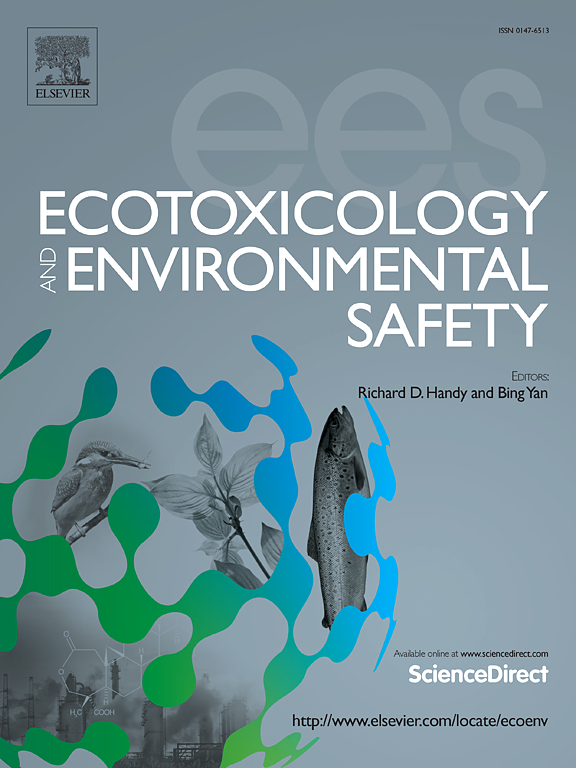Early-life polystyrene nanoplastics exposure impairs pathogen avoidance behavior associated with intestine-derived insulin-like neuropeptide (ins-11) and serotonin signaling in Caenorhabditis elegans
IF 6.2
2区 环境科学与生态学
Q1 ENVIRONMENTAL SCIENCES
引用次数: 0
Abstract
Nanoplastics (NPs) contamination is an emerging global concern due to the widespread use of plastic products and their potentially negative health impact on ecosystems. Despite their ubiquity, the effects of early-life NPs exposure on host-pathogen interactions remain largely unknown. In this study, we show that early-life exposure to polystyrene NPs (PS-NPs, 100-nm) at predicted environmentally relevant concentrations (10 µg/L) significantly impairs food preference and reduces avoidance of the pathogenic bacterium Bacillus thuringiensis in Caenorhabditis elegans. Exposure to PS-NPs led to a decrease in avoidance from 40.3 % in controls to 30.6 % at 10 µg/L and further to 23.1 % and 17.4 % at 50 and 100 µg/L, respectively. Mechanistic insights reveal that PS-NPs downregulate intestine-derived insulin-like neuropeptide (ins-11) via the transcription factor HLH-30 and the p38 MAPK signaling pathways, both are essential for avoidance behavior. Notably, acute serotonin treatment restored the avoidance behavior, indicating a role of serotonin signaling in this process. Our study indicates that early-life exposure to PS-NPs (100-nm) adversely affects the avoidance behavior of C. elegans, making them more vulnerable to harmful pathogens, thereby affecting their health. These findings highlight significant ecological and health hazards by early-life PS-NPs exposure.
生活早期接触聚苯乙烯纳米塑料会损害与肠源性胰岛素样神经肽(ins-11)和线粒体5-羟色胺信号相关的病原体回避行为
由于塑料产品的广泛使用及其对生态系统的潜在负面健康影响,纳米塑料(NPs)污染正在成为全球关注的新问题。尽管纳米塑料无处不在,但生命早期暴露于纳米塑料对宿主-病原体相互作用的影响在很大程度上仍然未知。在这项研究中,我们发现在草履虫生命早期暴露于预测的环境相关浓度(10 µg/L)的聚苯乙烯氮氧化物(PS-NPs,100-nm)会显著影响草履虫对食物的偏好,并降低草履虫对苏云金芽孢杆菌这种病原菌的回避程度。接触 PS-NPs 后,避食率从对照组的 40.3% 降至 10 µg/L 时的 30.6%,在 50 µg/L 和 100 µg/L 时又分别降至 23.1% 和 17.4%。机理研究发现,PS-NPs 可通过转录因子 HLH-30 和 p38 MAPK 信号通路下调肠源性胰岛素样神经肽 (ins-11),而 HLH-30 和 p38 MAPK 信号通路对回避行为都至关重要。值得注意的是,急性血清素治疗可恢复回避行为,这表明血清素信号在这一过程中发挥作用。我们的研究表明,在生命早期暴露于 PS-NPs(100 纳米)会对秀丽隐杆线虫的回避行为产生不利影响,使其更容易受到有害病原体的侵害,从而影响其健康。这些发现凸显了生命早期暴露于 PS-NPs 对生态和健康的重大危害。
本文章由计算机程序翻译,如有差异,请以英文原文为准。
求助全文
约1分钟内获得全文
求助全文
来源期刊
CiteScore
12.10
自引率
5.90%
发文量
1234
审稿时长
88 days
期刊介绍:
Ecotoxicology and Environmental Safety is a multi-disciplinary journal that focuses on understanding the exposure and effects of environmental contamination on organisms including human health. The scope of the journal covers three main themes. The topics within these themes, indicated below, include (but are not limited to) the following: Ecotoxicology、Environmental Chemistry、Environmental Safety etc.

 求助内容:
求助内容: 应助结果提醒方式:
应助结果提醒方式:


